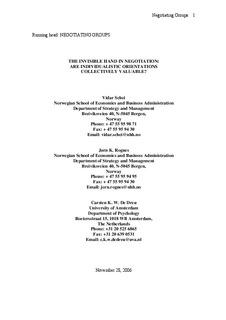| dc.contributor.author | Schei, Vidar | |
| dc.contributor.author | Rognes, Jørn K. | |
| dc.contributor.author | Dreu, Carsten K.W. De | |
| dc.date.accessioned | 2007-06-27T11:01:25Z | |
| dc.date.available | 2007-06-27T11:01:25Z | |
| dc.date.issued | 2006-11 | |
| dc.identifier.issn | 1503-5093 | |
| dc.identifier.uri | http://hdl.handle.net/11250/164278 | |
| dc.description.abstract | This study examines how group members’ individualistic or cooperative
motivational orientations impact the process and outcomes in negotiating groups. A total
of 228 students participated in a three-person negotiation simulation where orientation
was induced through written instructions and members were aware of each other’s
orientations. Results showed that groups with only cooperative members were more
satisfied with the negotiation than members of the other group compositions.
Conversely, groups with only individualistic members reached higher joint outcome than
groups with only cooperative members and groups with a mix in orientations. Processanalyses
indicated that the individualistic groups increased their integrative activities and
decreased their distributive activities towards the end of the negotiation. The results
challenge the dominating view that individualistic orientations are detrimental for
constructive group-process and high joint outcome. | en |
| dc.language.iso | eng | en |
| dc.publisher | Norwegian School of Economics and Business Administration. Department of Strategy and Management | en |
| dc.relation.ispartofseries | Discussion paper | en |
| dc.relation.ispartofseries | 2006:4 | en |
| dc.subject | negotiating groups | en |
| dc.title | The invisible hand in negotiation : are individualistic orientations collectively valuable? | en |
| dc.type | Working paper | en |
| dc.subject.nsi | VDP::Samfunnsvitenskap: 200::Psykologi: 260::Organisasjonspsykologi: 268 | en |
